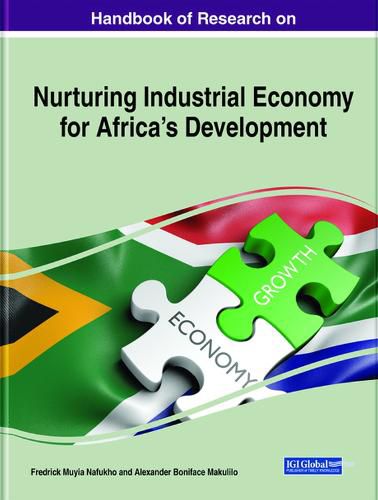Readings Newsletter
Become a Readings Member to make your shopping experience even easier.
Sign in or sign up for free!
You’re not far away from qualifying for FREE standard shipping within Australia
You’ve qualified for FREE standard shipping within Australia
The cart is loading…






This title is printed to order. This book may have been self-published. If so, we cannot guarantee the quality of the content. In the main most books will have gone through the editing process however some may not. We therefore suggest that you be aware of this before ordering this book. If in doubt check either the author or publisher’s details as we are unable to accept any returns unless they are faulty. Please contact us if you have any questions.
A robust manufacturing sector is a necessity and a sufficient condition for any country’s human and economic development as it creates employment and alleviates poverty. During this Fourth Industrial Revolution era, there is an urgent need in Africa to optimally utilize the existing resources to support manufacturing or else risk allowing the continent to fall behind in the industrial economy. Innovative strategies are needed that can unlock Africa’s manufacturing potential by exploring key areas that may help Africa mature and launch modernized economies that will benefit the developed world’s industrial economy. The Handbook of Research on Nurturing Industrial Economy for Africa’s Development examines various innovations necessary for Africa’s economic development including drivers of the manufacturing economy such as education, agriculture, human capital, science and technological innovations, language, politics, and business environments. The book explores strategies to increase Africa’s economic diversity, complexity, productivity, and ultimately competitiveness, and for the continent to realize its manufacturing/industrial potential. Further, chapters focus on African countries’ industrial economies in the African context and facilitating the fulfillment of the Sustainable Development Goals (SDGs) and the African Union’s Agenda 2063. This book is a valuable reference tool for government officials, economists, industrialists, practitioners, stakeholders, researchers, academicians, and students interested in the industrial economic development of Africa.
$9.00 standard shipping within Australia
FREE standard shipping within Australia for orders over $100.00
Express & International shipping calculated at checkout
This title is printed to order. This book may have been self-published. If so, we cannot guarantee the quality of the content. In the main most books will have gone through the editing process however some may not. We therefore suggest that you be aware of this before ordering this book. If in doubt check either the author or publisher’s details as we are unable to accept any returns unless they are faulty. Please contact us if you have any questions.
A robust manufacturing sector is a necessity and a sufficient condition for any country’s human and economic development as it creates employment and alleviates poverty. During this Fourth Industrial Revolution era, there is an urgent need in Africa to optimally utilize the existing resources to support manufacturing or else risk allowing the continent to fall behind in the industrial economy. Innovative strategies are needed that can unlock Africa’s manufacturing potential by exploring key areas that may help Africa mature and launch modernized economies that will benefit the developed world’s industrial economy. The Handbook of Research on Nurturing Industrial Economy for Africa’s Development examines various innovations necessary for Africa’s economic development including drivers of the manufacturing economy such as education, agriculture, human capital, science and technological innovations, language, politics, and business environments. The book explores strategies to increase Africa’s economic diversity, complexity, productivity, and ultimately competitiveness, and for the continent to realize its manufacturing/industrial potential. Further, chapters focus on African countries’ industrial economies in the African context and facilitating the fulfillment of the Sustainable Development Goals (SDGs) and the African Union’s Agenda 2063. This book is a valuable reference tool for government officials, economists, industrialists, practitioners, stakeholders, researchers, academicians, and students interested in the industrial economic development of Africa.